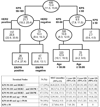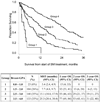Effect of tumor subtype on survival and the graded prognostic assessment for patients with breast cancer and brain metastases
- PMID: 21497451
- PMCID: PMC3172400
- DOI: 10.1016/j.ijrobp.2011.02.027
Effect of tumor subtype on survival and the graded prognostic assessment for patients with breast cancer and brain metastases
Abstract
Purpose: The diagnosis-specific Graded Prognostic Assessment (GPA) was published to clarify prognosis for patients with brain metastases. This study refines the existing Breast-GPA by analyzing a larger cohort and tumor subtype.
Methods and materials: A multi-institutional retrospective database of 400 breast cancer patients treated for newly diagnosed brain metastases was generated. Prognostic factors significant for survival were analyzed by multivariate Cox regression and recursive partitioning analysis (RPA). Factors were weighted by the magnitude of their regression coefficients to define the GPA index.
Results: Significant prognostic factors by multivariate Cox regression and RPA were Karnofsky performance status (KPS), HER2, ER/PR status, and the interaction between ER/PR and HER2. RPA showed age was significant for patients with KPS 60 to 80. The median survival time (MST) overall was 13.8 months, and for GPA scores of 0 to 1.0, 1.5 to 2.0, 2.5 to 3.0, and 3.5 to 4.0 were 3.4 (n = 23), 7.7 (n = 104), 15.1 (n = 140), and 25.3 (n = 133) months, respectively (p < 0.0001). Among HER2-negative patients, being ER/PR positive improved MST from 6.4 to 9.7 months, whereas in HER2-positive patients, being ER/PR positive improved MST from 17.9 to 20.7 months. The log-rank statistic (predictive power) was 110 for the Breast-GPA vs. 55 for tumor subtype.
Conclusions: The Breast-GPA documents wide variation in prognosis and shows clear separation between subgroups of patients with breast cancer and brain metastases. This tool will aid clinical decision making and stratification in clinical trials. These data confirm the effect of tumor subtype on survival and show the Breast-GPA offers significantly more predictive power than the tumor subtype alone.
Copyright © 2012 Elsevier Inc. All rights reserved.
Figures


Similar articles
-
Validation and Development of a Modified Breast Graded Prognostic Assessment As a Tool for Survival in Patients With Breast Cancer and Brain Metastases.J Clin Oncol. 2015 Jul 10;33(20):2239-45. doi: 10.1200/JCO.2014.58.8517. Epub 2015 May 18. J Clin Oncol. 2015. PMID: 25987700 Free PMC article.
-
The effect of tumor subtype on the time from primary diagnosis to development of brain metastases and survival in patients with breast cancer.J Neurooncol. 2013 May;112(3):467-72. doi: 10.1007/s11060-013-1083-9. Epub 2013 Mar 6. J Neurooncol. 2013. PMID: 23462853
-
External validation of Modified Breast Graded Prognostic Assessment for breast cancer patients with brain metastases: A multicentric European experience.Breast. 2018 Feb;37:36-41. doi: 10.1016/j.breast.2017.10.006. Epub 2017 Oct 23. Breast. 2018. PMID: 29073498 Clinical Trial.
-
Prolonged survival after diagnosis of brain metastasis from breast cancer: contributing factors and treatment implications.Jpn J Clin Oncol. 2015 Aug;45(8):713-8. doi: 10.1093/jjco/hyv067. Epub 2015 May 15. Jpn J Clin Oncol. 2015. PMID: 25981620
-
Analysis of survival outcomes based on molecular subtypes in breast cancer brain metastases: A single institutional cohort.Breast J. 2018 Nov;24(6):920-926. doi: 10.1111/tbj.13111. Epub 2018 Sep 14. Breast J. 2018. PMID: 30596408
Cited by
-
Clinical implication of Time To Brain Metastasis (TTBM) according to breast cancer subtypes.Springerplus. 2013 Mar 28;2(1):136. doi: 10.1186/2193-1801-2-136. Print 2013 Dec. Springerplus. 2013. PMID: 23667803 Free PMC article.
-
Intracranial management of HER-2 overexpression breast cancer with extensive volume or symptomatic brain metastases.Front Oncol. 2024 Jul 1;14:1386909. doi: 10.3389/fonc.2024.1386909. eCollection 2024. Front Oncol. 2024. PMID: 39011485 Free PMC article.
-
Molecular subtyping of brain metastases and implications for therapy.Curr Treat Options Oncol. 2013 Dec;14(4):514-27. doi: 10.1007/s11864-013-0248-2. Curr Treat Options Oncol. 2013. PMID: 23907440
-
Impact of breast cancer molecular subtypes on the incidence, kinetics and prognosis of central nervous system metastases in a large multicentre real-life cohort.Br J Cancer. 2019 Dec;121(12):991-1000. doi: 10.1038/s41416-019-0619-y. Epub 2019 Nov 13. Br J Cancer. 2019. PMID: 31719684 Free PMC article.
-
Brain metastases: A Society for Neuro-Oncology (SNO) consensus review on current management and future directions.Neuro Oncol. 2022 Oct 3;24(10):1613-1646. doi: 10.1093/neuonc/noac118. Neuro Oncol. 2022. PMID: 35762249 Free PMC article. Review.
References
-
- Jemal A, Siegel R, Xu J, Ward E. Cancer Statistics 2010. CA Cancer J Clin. 2010;60(5):277–300. - PubMed
-
- Barnholtz-Sloan JS, Sloan AE, Davis FG, Vigneau FD, Lai P, Sawaya RE. Incidence proportions of brain metastases in patients diagnosed (1973–2001) in the metropolitan Detroit cancer surveillance system. J Clin Onc. 2004;22(14):2865–2872. - PubMed
-
- Zimm S, Wampler GL, Stablein D, et al. Intracerebral metastases in solid-tumor patients: Natural history and results of treatment. Cancer. 1981;48:384–394. - PubMed
-
- Posner JB. Neurologic Complications of Cancer. Philadelphia: FA Davies; 1995.
-
- Bendell JC, Domchek SM, Burnstein HJ, Harris L, Younger J, Kuter I, Bunnell C, Rue M, Gelman R, Winer E. Central nervous system metastases in women who receive trastuzumab-based therapy for metastatic breast carcinoma. Cancer. 2003;97:2972–2977. - PubMed
Publication types
MeSH terms
Substances
Grants and funding
LinkOut - more resources
Full Text Sources
Medical
Research Materials
Miscellaneous

